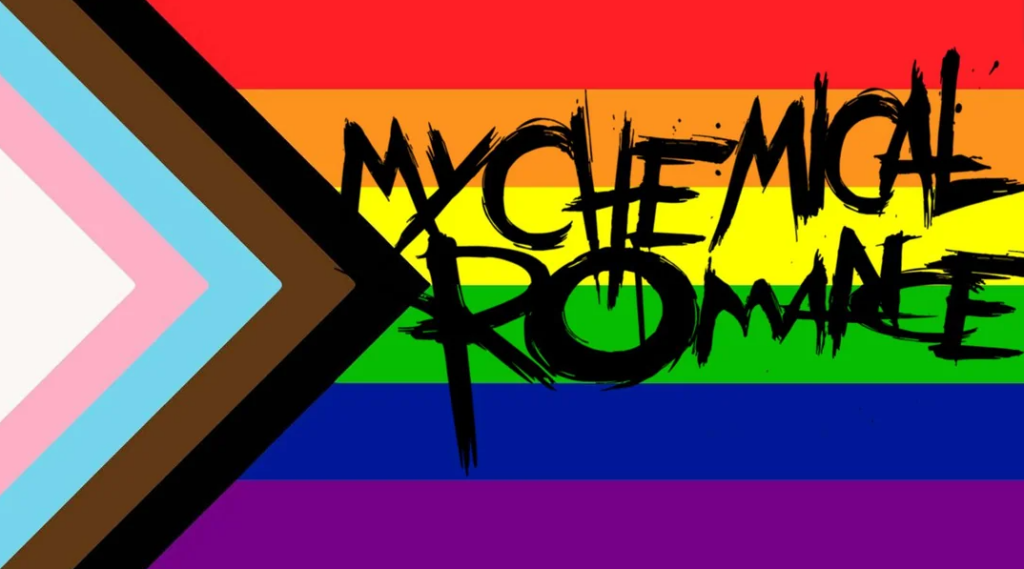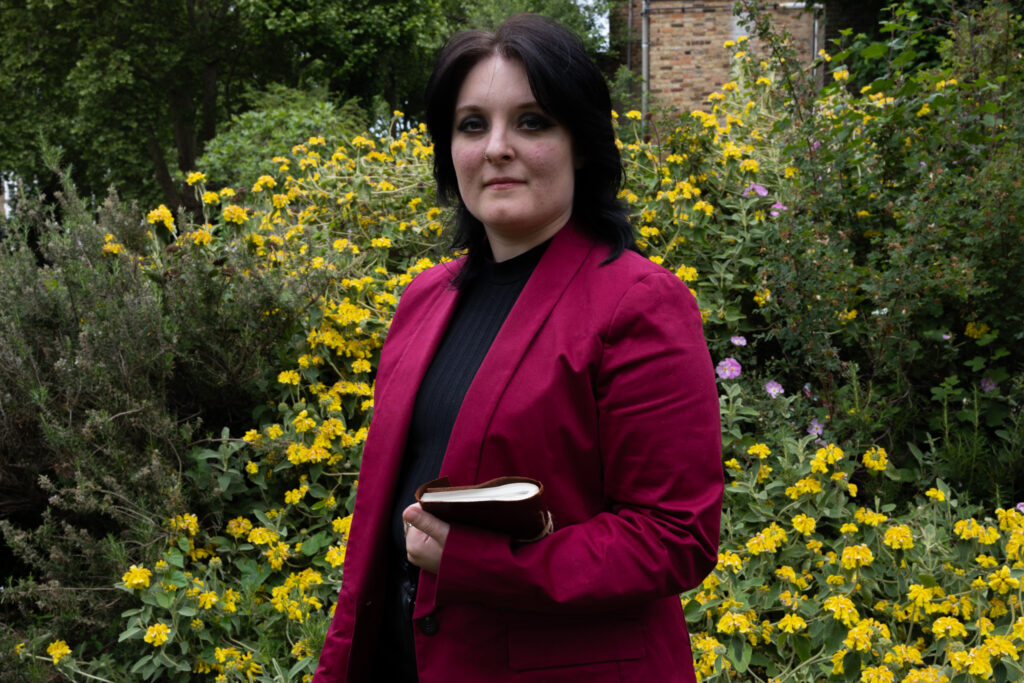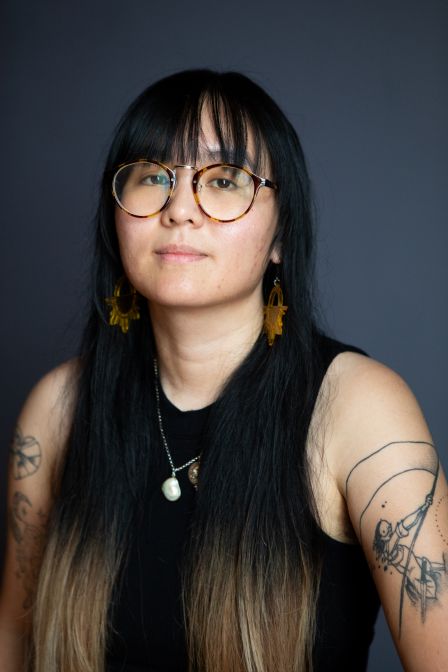
On July 22 at 12 PM CST, the CPM is hosting a virtual LGBTQ+ Emo Scholars panel on Zoom. You can RSVP for the panel by emailing logan.dalton@mtsu.edu or at this link.
The panelists are poet and storyteller Mikayla Elias (they/them), University of Virginia Department of Women, Gender, and Sexuality professor Isabel Felix Gonzales (they/them), and Center for Popular Music head librarian Logan Dalton (they/them).
You can find out more about Mikayla, Isabel, and Logan in this blog post, which will also feature three My Chemical Romance and/or Fall Out Boy songs personally selected by them that are relevant to their upcoming presentations.
Scroll down to the bottom for a special playlist with all 10 songs!

Mikayla’s Picks
Mikayla Elias is a poet and storyteller, who recently earned an MA in Creative Writing from Queen Mary University of London. Their work leans into processing trauma and pressing toward intersectional equity and can be found in publications across the digital and physical world, including Querencia Press, Waxing and Waning Journal, and Lez Spread the Word. Mikayla’s debut poetry collection bending toward the light was released in 2022.

1. “7 Minutes in Heaven (Atavan Halen)” by Fall Out Boy from From Under the Cork Tree (2005)
The root of my upcoming ekphrastic collection [icon]ography lies in understanding one’s own youth and the legacy thereof. “7 Minutes in Heaven (Atavan Halen)” perfectly encapsulates the follies of youth as a mentally ill person. Inspired by Pete Wentz’ suicide attempt, this song is a voyeuristic, self-isolated account of outsider-ness. It returns the subject to a place where isolation is all-consuming, and the self is rejected as a frightening affect of being known.
2. “G.I.N.A.S.F.S” by Fall Out Boy from Infinity on High (2007)
Conversely, “G.I.N.A.S.F.S.” is a song born out of the necessity and urgency of queerness in the 2000s. Here, the self is an essential life-force, a subversive way of protesting heteronormativity. Coming from a band that was subject to scrutiny of their gender and sexualities (During this period especially.), the individual is given permission on a public scale to buck supposition.
3. “Baby Annihilation” by Fall Out Boy from So Much (For) Stardust (2023)
“Baby Annihilation” departs from the questions of youth and dips into questioning the self with the space of age and time. Yet, it keeps us rooted in the cycles of despair, self-deprecation, and grappling with success. As part of [icon]ography’s call to action, this song invites the subject back into a morally questionable world tinged by rose-colored glasses.

Isabel’s Picks
Isabel Felix Gonzales is a Rising Scholars Postdoctoral Fellow in the Department of Women, Gender, and Sexuality at the University of Virginia and a New City Arts Fellow. Their visual and written work is interested in the visual and political cultures of the 21st century and how queer, trans, and nonbinary people of color engage in forms of illegibility, unruliness, kin-making, escape, and refusal. Their work has been published in The Palgrave Handbook of Fashion and Politics, Terrorism in Youth Popular Culture, and SWARM: Answering the Call (A My Chemical Romance Fanzine)
Isabel received a PhD in Political Science from the University of California, Irvine and is currently working on their book, ALL THE BELOVED I COULDN’T DESCRIBE: Queer Illegibility and 21st Century Crisis of Identity.

4-5. “The End.”/”Dead!” by My Chemical Romance from The Black Parade (2006)
Though technically two songs, “The End.” and “Dead!” function as a unit, simultaneously opening The Black Parade and overturing comfortable understandings of what the album—and what My Chemical Romance—could or would be. A slow, deliberate dirge that transforms (transitions, even) into an explosion of bombastic rock guitar, the dyad of “The End.” and “Dead!” problematizes tidy, linear narratives of progress and becoming through starting at the end, starting through death, and embracing transformation, movement, and evasiveness, but also ugliness, anger, friction, and uncanniness, thus generating a form of queer possibility. While “Mama” is most often taken as the band’s queerest song, it is a line in “The End.” that most embodies The Black Parade’s frictive queer horizon of transformation without fixity or destination: “When I grow up, I want to be nothing at all.”
6. “The Foundations of Decay” by My Chemical Romance (2022)
My Chemical Romance’s first single since their initial breakup in 2013, “The Foundations of Decay,” is an explosive statement of intent. Sonically, lyrically, and compositionally different from anything the band has produced before, “Foundations” is a reflection on legacy without nostalgia. Like the dyad of “The End.” and “Dead!”, this song embraces decay, rot, vermin, and the frictive feelings that are seen as stifling, disgusting, improper, unproductive, or that which must be heavily policed and managed. When surrounded by ascendant authoritarianism, climate catastrophe, and extreme economic inequality, surrendering to the comfortable, the familiar, and the nostalgic is a form of self-soothing, a clinging to the impossible promise of return. Against this, My Chemical Romance’s aggressive embrace of the disgusting, the uncomfortable, and the relentlessly angry offers an alternative mode of optimism, one that demands to “GET UP, COWARD” in the face of extermination.
7. “The Kintsugi Kid (10 Years)” by Fall Out Boy from So Much (For) Stardust (2023)
While My Chemical Romance embodies a kind of acerbic optimism, Fall Out Boy has long functioned as their equal and opposite, serving up unflinching pessimism against poppy, danceable melodies. Like “The Foundations of Decay” So Much (for) Stardust is also a reflection on legacy, an attempt to account for one’s life while anticipating an uncertain, potentially apocalyptic future. All the while, situated in a kind of extended (fall out) boyhood, the band embodies a kind of failure of normative masculinity. This is most explicit in “The Kintsugi Kid (10 Years),” Fall Out Boy’s riff on Don Henley’s “The Boys of Summer.” While Henley’s narrator luxuriates in the golden-tinged nostalgia of a boyhood he outgrew to achieve manhood, which is to say, full reproductive citizenship, Fall Out Boy’s narrator longs for the “Ten years, ten years in a bit of chemical haze” where they felt “Nothing, nothing, nothing, nothing.” Against fifteen years of “It Gets Better,” this yearning for a worse version of oneself complicates conversations around wellness, agency, and survival, which, in the process, makes space for other kinds of being in the world.

Logan’s Picks
Logan Dalton is the head librarian at the Center for Popular Music at Middle Tennessee State University. Prior to joining the CPM, they worked as a cataloging librarian for Ingram Content Group and as the systems and technical services librarian at the University of Lynchburg. In addition to being a librarian, Logan has been a freelance pop culture writer and reviewer since 2013, mainly focusing on television, film, and comics, and the connection between these mediums as well as literature, music, and progressive politics. Some outlets they’ve written for include Graphic Policy, Booklist, and The Mary Sue. They recently did a presentation on My Chemical Romance and violent black and white independent comics at the 2025 Popular Culture Association national conference.

8. “You Know What They Do to Guys Like Us in Prison” by My Chemical Romance from Three Cheers for Sweet Revenge (2004)
When I think of queerness and gender in the songs of My Chemical Romance, “You Know What They Do to Guys Like Us in Prison” immediately pops into my head. In an interview with Kerrang! journalist Tom Bryant, frontperson Gerard Way mentioned that this song is about “lost masculinity” and uses the metaphor of prison for life on the road in the tour bus. Lyrics like “They make me do pushups in drag” and the on-stage homoerotic tension (They would kiss on stage and sometimes share a bunk on tour buses.) between Way and the track’s featured vocalist Bert McCracken of The Used play with gender norms in a cheeky way that harks back to 1970s glam rock. Later, My Chemical Romance and The Used would even cover “Under Pressure” setting up Gerard Way and McCracken as the early 21st century, third wave emo heirs of bisexual gender rebels, Freddie Mercury and David Bowie. Coupled with MCR’s outspoken stance against homophobia and stereotypical rock’n’roll “groupie culture” at that time, “Prison” was an early salvo for transgressing gender binaries and against heteronormativity.
9. “Vampires Will Never Hurt You” by My Chemical Romance from I Brought You My Bullets, You Brought Me Your Love (2002)
Before becoming the frontperson of a successful rock band, Gerard Way was a comic book writer and artist earning a BFA at New York’s School of the Visual Arts, interning for DC Comics, and designing action figures for Marvel. As a teenager, he also scripted a short-lived black and white vigilante comic called On Raven’s Wings for the underground publisher Boneyard Press, which was most famous for its unauthorized graphic novel biography of Jeffrey Dahmer. Way’s love of horror fiction, such as films like Dawn of the Dead and music by fellow New Jersey punk rockers The Misfits, and dark anti-hero comics like James O’Barr’s The Crow and David Quinn and Tim Vigil’s Faust comes out in his lyrics on My Chemical Romance’s early records. In the band’s debut single “Vampires Will Never Hurt You”, My Chemical Romance begins their tradition of using genre fiction elements, like vampires, zombies, Western gun fighters, superheroes, and dystopian freedom fighters to name a few, as metaphors for real life problems like struggles with addiction or romantic relationships. The music video featured the band in corpse makeup with black eyeliner and clothing taken straight from Bela Lugosi’s dressing room hinting at how costumes and visuals would be an important part of the band’s appeal going forward as Gerard Way transformed his sketches, comics scripts, and short stories into songs and albums.
10. “I Never Told You What I Do for a Living” by My Chemical Romance from Three Cheers for Sweet Revenge (2004)
Revenge and extreme violence are cornerstones of the lyrical and visual iconography of the first two My Chemical Romance albums I Brought You My Bullets, You Brought Me Your Love and Three Cheers for Sweet Revenge. Three Cheers for Sweet Revenge is even a loose concept album about a man who must kill 1,000 evil men and bring their souls to the devil so he can be reunited with his lost love. “I Never Told You What I Do for a Living” concludes this storyline in blood-splattered, guilt-ridden fashion as the protagonist realizes that he’s the 1000th soul. There is real anguish in Gerard Way’s vocal performance as he spins the yarn of an irredeemable soul while guitarists Ray Toro and Frank Iero unite for a chaotic, yet melodic punk rock breakdown. The lyric “Another knife in my hands, a stain that never comes off the sheets/Clean me off, I’m so dirty babe” reminds me of the relationship between the aforementioned comic Faust‘s protagonist John Jaspers and his therapist/lover Jade DeCamp, who still yearns for him while he’s covered in the blood of the men he’s killed with his claws (He makes Wolverine look like a Disney Junior cartoon.) and taunted by the demons in his head. However, unlike Faust, My Chemical Romance found mainstream success by offsetting the violent visions of tracks like “I Never Told You What I Do for a Living” with vulnerable, emotional ones like “Helena”, which is an homage to Gerard and Mikey Way’s relationship with their recently deceased grandmother that encouraged them to pursue art and music and even helped pay for the band’s first tour bus. However, in keeping with the classic quote “Before you embark on a journey of revenge, dig two graves”, Three Cheers for Sweet Revenge goes out in a hail of bullets.
-Mikayla Elias, Isabel Felix Gonzales, Logan Dalton
The views expressed in this blog are the staff members‘ own and do not necessarily reflect the views of The Center for Popular Music and Middle Tennessee State University.





